Wellness Renegades
Welcome to the Wellness Renegades Podcast! We’ll explore the crossroads of wellness entrepreneurs like you and me who are committed to making money while living healthier lives. People who are going against Big Pharma, insurance conglomerates, and the mainstream medical world. We’ll be journeying into the challenges and breakthroughs it takes to own your own business, pave the path through mainstream medical care, and truly become a Wellness Renegade.
Episodes
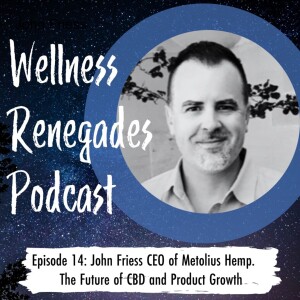
Tuesday Aug 01, 2023
Tuesday Aug 01, 2023
In this inspiring episode, we sit down with John Friess, serial entrepreneur, cofounder and CEO of Metolius Hemp. As Co-Founder and CEO of Metolius Hemp Company John and his team of co-founders are working to innovate the industrial hemp industry in a manner like no other company. They were recently awarded the ‘Most Pioneering CBD Company In North America’ supporting their vision and mission around what they deem the EXIT P.A.C.T.To learn more about EXIT P.A.C.T. visit https://www.mycannabis.com/metolius-exit-pact-harness-the-power-of-hemp-to-overcome-addictions/In this episode we discuss:
Hemp and the future of CBD
How farms are decreasing and usage of CBD is going up
Why most CBD products are under dosed
How ramping production and minimizing quality is not the way to go
And how John’s son with autism was helped with CBD
Wellness Renegade Links:Website: https://WellnessRenegades.comGoogle Business Profiles: https://wellnessrenegades.com/google-business-reviews/.
Link to the Transcript:https://bit.ly/WRep14
Instagram: @WellnessRenegadesSponsors: JaneAppJane is a HIPAA-compliant, all-in-one practice management software that’s loved by the acupuncture community.
Jane offers online booking, electronic charting, insurance billing, and integrated payments (to name a few) to help make your day-to-day easier.
To learn more about Jane, visit jane.app/acupuncture-us
John Friess’s Bio:
John Friess is focused on founding and building the marketability, viability and exit ability of idea and emerging stage startups. He has worked with hundreds of startups and is currently the CEO and cofounder of Metolius HempSocial Channels and Website:
Website: https://metolius.hemp
Instagram: https://www.instagram.com/metoliushemp
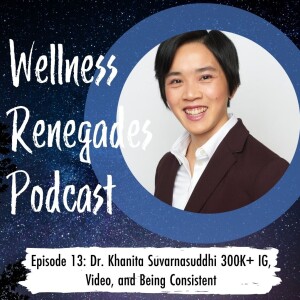
Monday Jun 12, 2023
Monday Jun 12, 2023
In this inspiring episode, we sit down with Dr. Khanita Suvarnasuddhi, an acupuncturist, chiropractor, and martial artist. Brace yourself for a wild ride as we unravel the secrets of content creation and perseverance. Driven by her passion for health and wellness, Dr. Khanita spills the beans on how she grew her Instagram following to over 300K and gives us a sneak peak into where she is headed next.
How her scarf video and bleeding an acupuncture point where the pivotal point in her going ‘viral’
What kept her going on social media when she wanted to quit
How instagram and social media followers have attracted more patients
Discovering her newfound love for hyperbaric chambers
How her own life is creating a clearer vision for her channels and practice
Wellness Renegade Links:Website: https://WellnessRenegades.comGoogle Business Profiles: https://wellnessrenegades.com/google-business-reviews/
Instagram: @WellnessRenegades
Link to the Transcript: https://bit.ly/WREpisode13Sponsors:JaneApp: jane.app/payments Free Trial: WELLNESSRENEGADE
Dr. Khanita’s Bio:
Approaching healing from an integrated perspective, Dr. Khanita blends her background of movement therapy, martial arts, chiropractic and Chinese Medicine to create a supportive environment for holistic transformation to take place.Social Channels and Website:
Website: https://arayaholistichealth.com/
Youtube: https://www.youtube.com/channel/UCBb7tMnxgd7QqOS54rcU_uA
Instagram: https://www.instagram.com/araya_hpm/
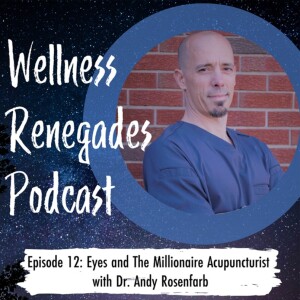
Monday Apr 24, 2023
Monday Apr 24, 2023
In this inspiring episode, we sit down with Dr. Andy Rosenfarb, an acupuncturist who specializes in Ophthalmology. Andy shares with us his journey from humble beginnings into becoming a millionaire acupuncturist.Andy also talks aboutHow he went from fascination to obsession as he discovered the world of eye care and Chinese Medicine.
His humbling start and lessons learned as new acupuncturist presenting to Western providersSharing about why he created an oil based eye drop that was needed in the marketplace.Leveraging his power of ADHD to make it a strength in running his practice.And his top tip in creating a positive Money Mindset in the field of acupuncture and wellness.Website: https://WellnessRenegades.comGoogle Business Profiles: https://wellnessrenegades.com/google-business-reviews/
Instagram: @WellnessRenegades
Link to the Transcript: https://bit.ly/WREpisode12
Dr. Rosenfarb’s bio:Dr. Rosenfarb is a world renowned expert on Chinese Medical Ophthalmology, Ophthalmic Acupuncture, and Functional Integrative Ophthalmology. He has been specializing for over 25 years and has worked with thousands of patients from over 50 countries who fly into New Jersey to work with Dr. Rosenfarb.
Links:Website: https://acuvisionacupuncture.com/
Facebook: https://www.facebook.com/retinitispigmentosasupport
LinkedIN: https://www.linkedin.com/in/andyrosenfarb/
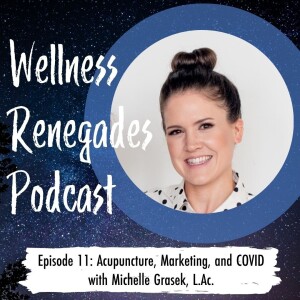
Monday Mar 06, 2023
Monday Mar 06, 2023
In this episode, we chat with Michelle Grasek, an acupuncturist who also specializes in marketing. Michelle shares with us her journey to becoming an acupuncturist and how her grandmother’s experience with acupuncture sparked her interest in the field.Michelle also talks aboutHer love for marketing and how she started her blog on Acupuncture Marketing.
The biggest struggles acupuncturists and healers face in marketing their practice.How the COVID pandemic impacted Michelle’s practice and how she shifted focus.The importance of thinking outside the box and finding one’s passion points to avoid burnout.What’s coming up for her in 2023 and how letting go of insurance gives you more timeWebsite: https://WellnessRenegades.comInstagram: @WellnessRenegades
For a full transcript of the episode, visit: https://bit.ly/WREpisode1
Michelle Grasek bio:
Michelle Grasek is the host of the Acupuncture Marketing School podcast. She's a practicing acupuncturist and marketing strategist and she's been teaching marketing, both online and in-person, for 9 years. In that time, Michelle has taught marketing to over 3,500 acupuncturists. It’s her mission to help you grow your business using marketing techniques that are genuine and generous.
Through MIchelle's articles and online PDA courses, she aims to help you outline a strategy, focus on marketing that’s authentic, and get new patients every week. She shares all of her practice-building tips at michellegrasek.com and on social media @michellegrasek.
Social Links:
- Instagram: @michellegrasek
- Facebook
- Website: www.michellegrasek.com
- Acupuncture Marketing School online class [15 PDAs]
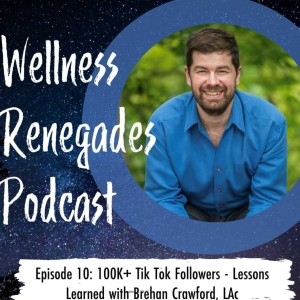
Tuesday Dec 07, 2021
Tuesday Dec 07, 2021
In this episode, Jason Stein interviews Tik Tok funny man Brehan Crawford. Brehan is an Acupuncturist and Chinese medicine professional in Oregon where he treats patients with complex & chronic conditions such as Lyme disease and Fibromyalgia.Join Jason and Brehan as they talk about:
How Brehan got started in Tik Tok
Keeping it real with other professionals who comment
What it’s like discussing COVID and Lyme Disease online
Website: https://www.crawford-wellness.com
TikTok: https://www.tiktok.com/@crawford_wellness
IG https://www.instagram.com/crawford_wellness
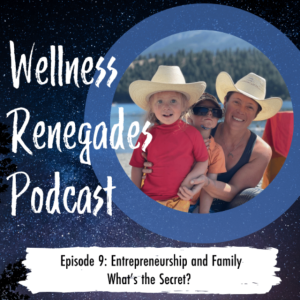
Tuesday Nov 16, 2021
Tuesday Nov 16, 2021
In this episode, Jason Stein and co founder Dr. Rachel Sterry, discuss the life of the entrepreneurial parent as we continue to live through the Pandemic and as they navigate business and parenting with two small kids in a tiny home. Join Dr. Rachel and Jason as they talk about:
Getting Country BotoxThe Intersection of Parenting and Business
Dads and Moms and the DifferencesFinding Your Flow with Kids
Connect with Dr. Rachel and Jason SteinWebsite: https://WellnessRenegades.com
Wellness Renegade Podcast: http://wellnessrenegades.podbean.com
Facebook: https://www.facebook.com/https://www.facebook.com/jason.stein2LinkedIn: https://www.linkedin.com/in/imjasonstein/
Instagram: https://www.instagram.com/imjasonstein/
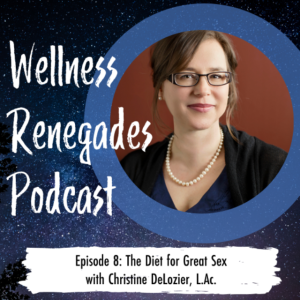
Monday Nov 15, 2021
Monday Nov 15, 2021
In this episode, Jason Stein interviews Christine DeLozier, acupuncturist, herbalist, Chinese Medicine expert, and author of “Diet for Great Sex,” a guide that walks readers through the specific foods that lead to great sex and dives deep into the science of how it works.
When an acupuncture client came in asking if she could help them improve their sexual health, Christine DeLozier began to search for the root of what makes sex great physiologically. She discovered nerves, blood vessels and hormones operate in synchrony was the secret to success - and that this trifecta could be affected by diet. Now, she uses this knowledge to help people develop dietary strategies to live healthier lives - in and out of the bedroom!
Join Christine and Jason as they talk about:
The psychological and physiological ingredients of great sex
How antioxidants reduce sexual dysfunction
Why you should start incorporating leafy greens into your diet - stat!
The small dietary changes that create big results
Ideal date-night foods and cocktails
The effect of environmental toxins on hormones and fertility
Why nutrition isn’t as prevalent in Western Medicine
For a full transcript of the episode, visit: bit.ly/WR8Transcript
About Christine DeLozier
As an acupuncturist and herbalist in private practice, Christine DeLozier, L.Ac., specializes in sexual health, treating males, females, and all orientations and identities.
Acupuncture is great for sexual function, but to address the underlying mechanics of consistently great sex, the key is diet. For this reason, she works with patients to develop dietary habits that support their sexual goals.
Connect with Christine DeLozier
Instagram: https://www.instagram.com/dietforgreatsex/
TikTok: https://vm.tiktok.com/ZMepWNyND/
Website: https://christinedelozier.com/
Get your copy of Diet for Great Sex at http://bit.ly/DietForGreatSex
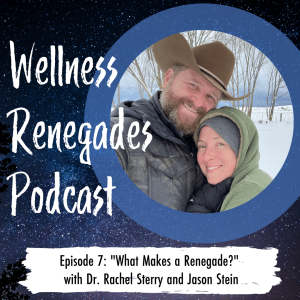
Monday Mar 22, 2021
Monday Mar 22, 2021
In this episode, Jason Stein invites Dr. Rachel Sterry onto the show to discuss what inspires certain people to break from the status quo and become Wellness Renegade.Convinced there was a better way to do business than working a traditional 9 to 5 job (or to the detriment of your own health) Jason and Rachel set out to find it. They entered the wellness industry and quickly started to notice a pattern: those with healthier work environments had healthier lives. And those who had healthier lives had healthier businesses.It was from this idea that Jason and Rachel founded the Wellness Renegades, a community where rogue wellness entrepreneurs can find the support, direction, focus, advice, tools, and relationships to craft better businesses and better lives.
Join Jason and Rachel as they talk about:
what inspired them to become Renegades
the corruption of the health insurance industry
the value of a community
bartering and “in-kind” agreements
the characteristics of a Wellness Renegade
taking risks and making big life changes
overcoming a fear of setting boundaries
exciting Wellness Renegades projects in the works
For a full transcript of this episode, visit http://bit.ly/WRPEpisode7
Connect with Jason and RachelDr. Rachel’s Website: https://fitmamapdx.com/
Jason’s Website: jasonstein.com
Wellness Renegades Patreon: https://www.patreon.com/wellnessrenegades
Email Jason: jason@jasonstein.com
Email Dr. Rachel: DrRachel@fitmamapdx.com
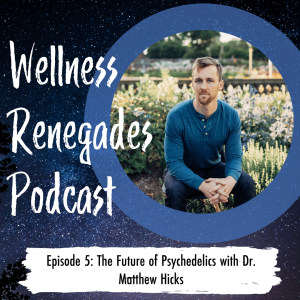
Thursday Mar 04, 2021
Thursday Mar 04, 2021
In this episode, Jason Stein interviews Dr. Matthew Hicks, ND, a naturopathic doctor who has made it his life’s work to help people live healthier, happier, and better lives through the use of psychedelics. Dr. Hicks has always wanted to use naturopathic medicine to help people to recover their mental health - but it wasn’t until a fateful presentation by Erica Zelfand, ND that Matthew discovered the potential (and power) of using psychedelics to aid in healing. An ND degree and many years of research and training later, Dr. Hicks now leads Ketamine and Psilocybin Retreats, facilitates Psychotherapy and Psychedelic Therapy Training, and is designing programs for Psilocybin Therapy. Join Dr. Hicks and Jason as they talk about:
Oregon’s progressive new laws concerning Psilocybin - and their risks
how Ketamine and Psilocybin work
the future of Psilocybin - will it share the fate of CBD?
microdosing
the good and the bad of hallucinogenic side effects
why psychedelics are not yet a part of mainstream medicine
and how to navigate the challenges that come with being a pioneer
For a full transcription of the episode, visit: http://bit.ly/WRP6Transcript
About Dr. HicksDr. Hicks is the founder of Synaptic Integrative Care and Training Institute in Portland, Oregon, offering ketamine assisted psychotherapy and psychedelic therapy training. He is the medical director of Silo Wellness offering psilocybin and ketamine retreats in Jamaica and Oregon. He also hosts the Integrative Psychiatry Review podcast.Connect with Dr. HicksSilo Wellness Retreats: https://siloretreats.com/
Synaptic Integrative Care and Training Institute: https://www.synaptic.care/
Podcast: https://www.drmatthewhicks.com/
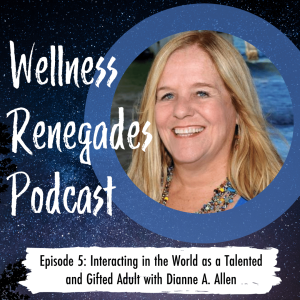
Wednesday Jan 20, 2021
Wednesday Jan 20, 2021
In this episode, Jason Stein interviews Dianne A. Allen, a gifted intuitive mentor, author, speaker, podcast host, and SSP technician, determined to help people break free from outdated thinking, reshape their personal narrative, and let their light shine.A talented and gifted person herself, Dianne is well-versed in helping people of all paths make friends with the trials and tribulations of being gifted. She knows the gifted experience comes with brilliance, wonder, and insatiable curiosity… and overstimulation, loneliness, and frequent misunderstanding. Over the past four decades, she’s worked with kids, coaches, CEOs, and Grammy winners alike to help them realize their truth, manage their highs and lows, and find a community where they’ll feel seen and celebrated. Join Dianne and Jason as they talk about:
The “shadow side” of giftedness
Helping others see the greatness inside themselves
How to be a good steward of your own being
Ensuring financial flow in unpredictable economies
The important connection between the Vagus Nerve and the nervous system
How to share your truth… and be heard
The importance of having a community.
The incredible power of words and their ability to jumpstart - or hinder - your growth
Connect with Ms. Dianne AllenWebsite: MsDianneAllen.comVisions Applied (Dianne’s publishing company) - VisionsApplied.comSomeone Gets Me Podcast: someonegetsme.podbean.comSomeone Gets Me Community: members.someonegetsme.com
Facebook: https://www.facebook.com/msdianneallenLinkedIn: https://www.instagram.com/dianne_a_allen/?hl=en
Instagram: https://www.linkedin.com/in/dianneallen/YouTube: https://www.youtube.com/channel/UCOu4J24z4iz3Dskj8RIg5jQ?disable_polymer=trueTranscript:
Jason Stein 0:01 Hi, this is Jason Stein, and welcome to another episode of the Wellness Renegades Podcast. Here, we explore the crossroads of wellness entrepreneurs like you and me, who are committed to making money while helping others live healthier lives, people who are going up against big pharma insurance conglomerates, and the mainstream medical models. In each episode, we journey into the challenges and breakthroughs it takes to own your own business, pave the path through conventional medicine, and truly become a Wellness Renegade. Today I'm here with Ms. Dianne Allen. Welcome, Dianne.
Dianne Allen 0:42 Hi, Jason. I'm glad to be here.
Jason Stein 0:45 Let's go ahead and tell the listeners just a little bit about who you are. Because I know you to be someone that's worked with Grammy winners, someone who's been a best selling author, someone who understands what it is to be talented and gifted, someone who understands addiction - the list goes on and on. So, in one sentence tell the listeners who you are.
Dianne Allen 1:09 One sentence: I am a gifted intuitive that helps people break out of the trance of living a life lower than they should and bring out their light - no matter what way it is,-whether it's free from addiction, or make friends with being gifted or all of those different things you just mentioned about me - because my core belief is that everybody has the right to health, wellness and happiness. And, the only thing in our way, is believing lies and our own belief systems that hold us back. So, my mission is to help people break through all of that, so that we're not living the lie anymore.
Jason Stein 1:46 It's so interesting: there are so many lies these days! Both in our own head and in geopolitics everywhere. So, what I'm really - I'm gonna roll up my sleeves with you today because I'm really interested in the conversation of talented and gifted. And for children, we know what that means: they go into TAG (Talented and Gifted) programs, they're in advanced classes, they're in college credit. But as an adult, there's this word I'm learning about: "2e." What, what the hell is that? What does that even mean "2e?"
Dianne Allen 2:20 "2e" is the short term that we use in the gifted world, it means twice-exceptional, which means the person is gifted, which means a high IQ with overexcitability and all of the gifted pieces. And there are other variants as well, like executive functioning issues, or maybe ADHD, or their learning strategy is different, or they're very, very sensitive, or they're very intuitive, or an empath. And so, this person not only has the challenges of being gifted (which has its own challenges), but they also have another overlying situation happening. So they need even more support and more guidance and assistance from people who are a little further down the road because sometimes it can get very tricky. So like I'm 2e, I have more than one thing going on. Most of the people I work with do, whether they call it that or not. That label comes mostly through the educators and gifted people. So the medical model, people don't use that. They don't - most of them don't even know what it is. And so it's - it's those of us who are really engaged with helping people live their vision. And two, we can get overlooked and misdiagnosed all the time.
Jason Stein 3:31 Well, I'm really curious about this, because I'm wondering like a grown adult who is either successful or striving for success? How many of them are willing to say, "Well, I'm twice exceptional?"
Dianne Allen 3:46 Probably none, unless they have been educated on what that really means.
Jason Stein 3:51 Mm-hmm.
Dianne Allen 3:51 And I most of the people that I work with Jason, they wouldn't call themselves gifted until I kind of helped them see that it's an asset that they maybe have been labeling as a liability. Or they had the misconception that calling themselves gifted or twice exceptional was an elitist kind of comment. And really, that's not the case, so they have to kind of make friends with themselves first. Most adults wouldn't use that language unless they're taught what it really means and can see that yes, you know, it's an exceptionality - but it doesn't mean that there's something wrong.
Jason Stein 4:23 So what happens to these people? Like, I think about, if we're using this chewy terminology of the kids in high school, there was one kid I know that got a perfect score on his LSAT. Clearly, he had other challenges. And so, when we're thinking about, like, educationally, children get a tremendous amount of support when they are high functioning and they are talented and gifted. What happens to the adult that is highly talented and gifted? What happens to them?
Dianne Allen 5:02 They can get lost in the system. They can get judged, missed, and feel really alone. And sometimes they struggle with addiction and feeling totally isolated. Some people try to hide their gifts, because you know, they want to be normal and fit in. I tried it, I made it about five minutes, I can't - that's not my skill set at all! And it's so we feel kind of like outliers like nobody really gets us and, and in some respects, only about 2% of the population actually will, because it's - it's a small, very small percentage of the population. And so that can get missed, they can get fired from jobs because they're, they're very intense and very focused. Often. I'm working with somebody now who's a business coach for a big medical facility and, and they were trying to fire the director of nursing because she was intense and focused. I'm like, well, let me see, you're running a hospital in the middle of COVID, you're totally gifted and talented, and you're dialed into solution... and the people above you want to talk about lunch or what's on TV. To a twice exceptional person, that's ridiculous, because you're saving lives. The concrete brain has trouble flipping back and forth in that transition, and so I try to help advocate for people, like, if you have a really gifted, talented person around and they get intense, be happy about it because that means they're solving problems nobody else can see.
Jason Stein 6:28 And let's just talk about this parallel between being gifted and addiction. Is the addiction - I'm assuming that it's to numb out that "I'm not normal, I'm different, I don't fit in." Or where does the addiction come in?
Dianne Allen 6:44 It sometimes is that, but it also very frequently starts because that glass of wine or that cocktail will ease the abundant input. You know, like the brains tired, there's so much going on. One of my new clients just said "I feel 1000 things at once, and now what do I do?" And so, that takes so much energy. When you learn that, oh, that glass of wine or that drink will numb it or slow it down even, you get that relief. But what you don't know is you're playing with fire, and you keep searching for that relief, and then pretty soon it can turn into a big problem, rather than using a healthier coping skill. So it - sometimes you can feel everything and nothing at the same time.
Jason Stein 7:29 And so I would think that - that with the proper support, that these talented and gifted individuals become great leaders in the world, is that true?
Dianne Allen 7:41 I believe it's true. I believe that's - that's where the solution to the bigger problems are within the gifted, the twice-exceptional people who can see it. They suffer often from existential depression, which medicine will not help. So, when somebody says I've tried all this medicine, and it didn't work, or it only helped a little bit, I start looking in the existential arena. Then, I start noticing that they can see solutions that nobody around them can see. So, if you see a solution to a big problem, and nobody around you gets you or can see it, that creates a sort of depression - but it's not solved with medicine. It's solved by making friends with that and then bridging yourself into the paradigm so that you can make the solution happen.
Jason Stein 8:22 Let's bring this down to like the street level of like existential depression. I don't think I'm 2e, I don't quite know what that means. What does that mean - existential depression?
Dianne Allen 8:36 It means that it's not chemical - that would be endogenous depression. It's not exogenous depression, which means (it's caused by a) situational, behavioral, or a change or transition. Existential means that it's above the cognitive, it's in the more in the spiritual realm. And most of the time, what you will hear somebody say is, "I'm really depressed because I can see the solution and nobody can hear me." They speak it maybe in a boardroom, or to their partner, to their family, like, "I can see what to do here. I can see the problem for the pollution, or I can see global warming, I can see what to do." And everyone around them poopoos it or denies it, or pretends like they're not even talking.
Jason Stein 9:27 Yeah.
Dianne Allen 9:28 And then they get depressed because nobody, nobody gets it, even though they can see it as clear as day. And here's the interesting thing, Jason. Typically, they're right.
Jason Stein 9:38 Yeah.
Dianne Allen 9:39 And the world takes about two or three years to catch up with them, you know.
Jason Stein 9:42 I think about Einstein, I think about Edison. I think about all the people that in the beginning, the masses thought they were crazy, and that they had no value. And it wasn't until later that their genius was truly appreciated and seen and so, what words of wisdom do you have for that person that's saying, "I see the solution." And everybody's like, "You should be locked up."
Dianne Allen 10:12 The word first word of wisdom is if you see the solution, document it, write it down, do a video, draw it out, do whatever, and then seek people who will hear you and you're going to find them in the gifted/twice exceptional community, because we all get it. And even if I can't understand what your solution means, I get that it is the solution. And so the moment you feel heard and understood, that's the game changer.
Jason Stein 10:39 Hm, and so I'm not invited to these conferences. And so what's one of the organizations that people could know about?
Dianne Allen 10:49 Well, every state has their own gifted consortium or gifted group. But the international one is called SENG. It stands for Supporting Emotional Needs of Gifted. It has the largest online library of resources, has monthly online meetings and a conference once a year where I speak in that conference. And it's, it's really fun because you get to be affirmed. You know, you have gifted children. So when you act like you're not gifted, I'm going to call you out on it, because it's not true.
Jason Stein 11:20 They get that from their mother, maybe. I yeah, I wasn't in TAG. But I think I have a gift in emotional intelligence, for sure. But normal IQ in the same community, do people talk IQ at all, or no?
Dianne Allen 11:39 They talk IQ, they talk overexcite abilities and intensities. They talk - they're just now talking about addiction. It's funny, I used to want to talk about it, and the powers that be, years ago, would always say, "Well, we don't have addiction problems in gifted people." So I opened a gifted substance abuse recovery center that filled up right away, so I let them see that that's not the case. Now they're letting us talk about it. And they talk about education things, they talk about coping skills - everything you can think of.
Jason Stein 12:07 Now, I told you, we're going to roll up our sleeves, and I'm really curious: Right now, if you're listening to this later in time and space, there's huge things going on with the US in politics and a breach of the Congress and Donald Trump is on his way out and a new President-Elect Joe Biden's coming in, and, and is Donald Trump 2e?
Dianne Allen 12:35 Um, probably the dark side of a lot of it.
Jason Stein 12:39 Okay, and then -
Dianne Allen 12:41 It can go awry. See, giftedness can go awry. They did a test of all of the gang member leaders in jail. They're all gifted.
Jason Stein 12:49 Okay, that makes sense to me. I would think that the gifted people become leaders and they become leaders of the Mexican Cartel. They become leaders of democracy. They become leaders of technology. They become leaders of everything. So then, if we talk about this, I just want to talk a little bit about the shadow side. So when we look at Donald Trump, in my experience, he is able to create a narrative and have people follow the narrative even if it's a false narrative. And I'm wondering, in the 2e world, are our narcissists 2e often or sociopaths or -
Dianne Allen 13:49 Those are two totally separate things. They don't correlate - at all. They don't correlate at all, but they can intertwine and they can be in the same person, but there's no correlation.
Jason Stein 14:00 Okay. And so, talk a little bit about why you think Donald Trump is gifted?
Dianne Allen 14:13 Well, because when I've watched him before he became president, he, he is very skilled at learning a system and finding all the holes in it. And mastering that, he's skilled at meeting somebody and finding their weak spot that they may not even know they have and exploiting it all over the place. He is a master at creating plausible truth, which means I can tell you something that's not true and tell it to you enough, in enough different ways, where you begin to say, well, maybe it's possible. That's why half - most of the people in the world are going "Well, I don't know what to believe." because it can come off so real. It's also - the screaming and yelling fits are very common in 2e people who are overwhelmed and overstimulated and don't take care of themselves and don't give themselves downtime. Too much, too quick will make any of us lose it. So there's that too. He's also calculating a lot of it. So, he's got more than one issue going on. The problems, as I see them are more mental health related and more undisclosed motive related, that leaks out. And yes, I am, I'm sure he's gifted, because somebody not gifted, could not manipulate and do all the things he's been doing over the years long before he became president.
Jason Stein 15:44 I'm just really curious why you think the people around him aren't trying to help him more if he does have some mental health challenges. Is it just because of power?
Dianne Allen 16:00 I would say first and foremost, denial, and secondly, fear,
Jason Stein 16:05 The fear of what?
Dianne Allen 16:07 Reprisal, being harmed, not being heard - because you know, when somebody points something out, he fires them or, or goes after them in some manner. And so, if somebody is afraid for their livelihood, or afraid for their life, or has a high fear level that he instills in them to control them. If they already had that propensity, then they're stuck, because what's one of the parts of high fear? It's freeze. You can't make a decision, can't do anything any different. Plus, there's the denial, and plus, there is cognitive re-ordering of what's going on. So I can think of my way around in a massage situation and say, "Well, it's not that bad." Well, if I tell myself, "It's not that bad enough," I believe it, even if it's not true. And I'm stuck - I'm in the trance.
Jason Stein 16:58 I get it. So it's actually creating a different reality, and then living whatever your reality is. My question, this is really an interesting thought. Like, there's a lot of talented and gifted leaders, but then there's people just on the street level, right? And so if I were to have a friend that acted like Donald Trump, but I saw their greatness as well, what can I do as a friend -
Dianne Allen 17:28 Point out their greatness. You know, like, I just - in my Someone Gets Me Community, I just did a post for everybody reminding them that they're perfect, whole and complete exactly as they are, they lacked nothing. And so when it's your friend, and they're having a hard time, you listen to them. You understand that that hard craziness is an overwhelm response. And then when it all decompresses, when they're all done losing it, then you say, "You know, what I see? The truth I see about you is you're kind or compassionate," - whatever it is you see, and you start speaking the truth that I see about you is, the truth that I see about you - and you keep saying it so that they can hear it, because it can't unhear you. Mm hmm. Right, so, and you help point out to go down that road, like, go down the road of the light, and educate. I educate a lot on, you know, maybe maybe the fact that you're having a hard time with all this overwhelm and all this anger is because anger comes from pain, and pain, the definition of pain is disconnection. So if you're disconnected in there, it's gonna feel kind of weird. So here's things that we do to get connected. Yeah, there are all kinds of things we can say, as friends to teach and ease somebody into seeing that. They might be struggling, but that doesn't mean it's hopeless.
Jason Stein 18:48 Yeah, it's interesting, because I guess I'm a bit of a skeptic that I would think that someone that is 2e, and they're moving into the shadow side and, and if I try to share what I see - my perspective, my truth - that they may feel like their cups already full, like they know it all, and they understand it all. And they can't really receive anything, because they have their own truth.
Dianne Allen 19:16 Well, that's why I said, first of all, you let them totally decompress. You don't try to say what you think when they're hyped, when they're overly stimulated, because it won't get in, number one. And number two, when you keep it very simple, this is what I see: there's no argument there. If you keep going and say, "Well, I feel this way" or bla bla bla and all that pontificating. People do that, that doesn't help. You know, like when I've had meltdowns before, I have a really good friend in my life, and she says, I see the truth of your being. Now there's times where I wanted to punch her when she said that, but the truth is, she sees the truth of my being. And so yeah, I might be looking crazy right now and I might be losing my mind because I'm overwhelmed. But at the end of the day, when I finally calm down - because they will calm dow -. Okay, there's, there's a higher truth in here, there's something in here. And that's why, like, all my clients I work with can call me anytime they want to, because the meltdowns usually don't happen 9 to 5, Monday through Friday. Yeah, so if they're having a tough day, or they just need to be brought back down to earth a little bit, then I have a real good skill set at helping to do that. Everybody needs other people in their corner, at least four or five people that can get it, that aren't going to be afraid of the meltdown looking because with high gifts comes in all kinds of ups and all kinds of now,
Jason Stein 20:36 I really appreciate what you're saying. Because when I work with people, I noticed that the people that reach out more, do better. Like I don't prompt them to reach out, it's the ones that on their own, that they use the laser call, or they email or text me outside of sessions. They actually do a lot better.
Dianne Allen 20:58 You've got to have support.
Jason Stein 21:00 And so for those, I'm curious as a learning question for me: for those that, you know, could benefit from more of that? Do you just remind them? Or do you prompt them? How do you bring it up?
Dianne Allen 21:13 Sometimes I remind them, and sometimes I use my impish kind of humor. And if if I intuitively go, "You know, I haven't heard from so and so." or "You know, they're probably going through something", or whatever it is, I'll just call them and say, "Hey, what are you doing?"
Jason Stein 21:29 Good! So you're not gonna let it ride out.
Dianne Allen 21:32 And then they go, "Huh, what?" I go "No, seriously, what are you doing? I was just thinking about you, what are you doing?" You know, or whatever, or ask them what kind of shoes they're wearing, or some question that's a little bit off, but they know it's me. So though, they'll humor me and then then they can have the opening to say something if they want to, or not, or whatever. But I know that it takes two to engage in that and sometimes when somebody is overwhelmed, the ability to reach out at a certain point goes away. So because the person's in freeze, right? They're in danger. So that's why I do a lot of SSP with people and really help get the nervous system to work in their favor.
Jason Stein 22:07 Okay, let's bring it street level: what's SSP?
Dianne Allen 22:10 SSP is Safe and Sound Protocol. It's a pre-cognitive music intervention that reregulates the entire nervous system. So herbs and vitamins you take get received by your body better. Your emotions are more aligned and calm. If you get stressed, you come back down quicker. All of your organs are affected because a Vagus Nerve is what it works on. So, most 2e people in my world, most people in this day and age could use some nervous system regulation. So I work both with their nervous system and with their belief system. And then, you know, how do you manage all of it?
Jason Stein 22:51 Yeah, it's such a weird conversation. Because as you're, as you're speaking, I could see how in some ways the listener might be like, she is just out there. What is she even talking about? And other people are like, you know, it's been proven with science that we are vibrations - there's a vibrational measurement that you can have on the body. So of course, sound waves are going to help heal the body. And our thought process somehow with the Internet has gone awry. Where is it that we can bring people back as renegades? that being a renegade doesn't mean that we're speaking like a ethereal crystal star - Like, no common sense - but really bringing it into the practical. So let me give you an example: I've been watching the vaccine conversation online. Lots of people like "Run out and get your vaccine!", right? Lots of people like, "There's way too many side effects - don't get your vaccine." and it becomes this like, thing. And but if you're pro vaccine, you're doing it because you want to save lives. I think that's the argument, right?
Dianne Allen 24:05 I guess.
Jason Stein 24:06 But most of those people aren't pro-starvation, where they're spending as much or equal amount of time to helping feed the hungry, which also saves lives. So my mind just like I think people have become stuck in their lands of like, "This makes sense. And I can't, I can't come to your side, because I've already made up my mind." And so what do we do with that?
Dianne Allen 24:35 Oh, I love this question. The first thing I do - and I got in a conversation about a similar thing last night - I made a comment and then the person jumped on the other side and started kind of getting all heated. So when they were all done being all heated, I said, "Well, I have a different view than you and one is there are no sides." And the moment that you go into that dualistic, "Pick a side!", you just cheapen all of life. So, let's get out of the "sides." I didn't mention anything about that other side, because that's not even what I was talking about, right? And so I don't live in the duality of "pick a side," I choose to live in the reality of good stewardship. And if I'm to be a good steward of my mind, my emotions, my body, my connections, all of it, then my question, the higher question is, how am I - am I being a good steward? For some people getting the vaccine might be being a good steward for them, in their world, and in their their life, whatever that looks like. And for others, it might be the opposite, or some variance in the middle. And we're all different. See, people think that everyone sees things the way we see and all the brains think the same. The truth is, no one sees anything exactly the same as anyone else. We have neurodiversity - our neurons are different - and we have different autobiographies and different sensitivities. It's impossible for two people to feel and see and experience anything exactly the same. Not possible. So we have to get out of these goofy, crazy ideas, and say, go within, and be a good steward of your own being, whatever that looks like. I mean, look how long into the pandemic, Jason, it took for them to say vitamins like zinc and vitamin D would help you.
Jason Stein 26:27 They're still not saying it. They're still I don't know why there's not like, you know, the Wash Your Hands ads? I don't know why there is an ads like "Take Vitamin D!"
Dianne Allen 26:36 Well, I've seen some ads about taking Zinc and vitamin D here.
Jason Stein 26:41 And you're in, you're in Florida?
Dianne Allen 26:43 I'm in Florida. Not much, a little bit. Finally! It's only been a few weeks. And those of us who are the Renegades are like, well, if we're going to be good stewards of Earth, of our bodies of - of all of this, then a stewardship means taking the highest and best care - not just average. It means like doing the very best we possibly can. So, we make our own decisions, and we get as much information as we can. So sometimes, as a Renegade, I find myself quietly educating, speaking my truth quietly and clearly. And when I got jumped on last night - and I have been jumped on by very many people -They just jumped to the other side and assume I'm for the other side, I said, "Who said that? I didn't say that."
Jason Stein 27:30 There is a lot of assumptions being made.
Dianne Allen 27:32 And so when I challenge that they back out and go, "Yeah, you're right." I said, "Well, I invite you to listen a little bit more clearly to those people that you're engaging with, because you were wrong." Now, what - does it change their long term behavior? I don't know. I don't, you know, but I want to stay in integrity.
Jason Stein 27:51 Well, one other thing, I wanted to talk about integrity. And, and this 2e conversation is really money. Like we the economy just did this very weird thing - partly because of politics, like many places had to lock down. You're one of the people that I know, that had an incredibly good 2020 financially. And so when we're all over the map, and a lot of Wellness Renegades are like, I want to be a Renegade, but I have to make a living. What do you say to them?
Dianne Allen 28:28 Yes. Yeah. They're correct.
Jason Stein 28:33 And any other words of wisdom there?
Dianne Allen 28:37 I am - well, again, I, I'm a Renegade in the sense that I start everything spiritually. So when I have financial things happen - and I have financial things happen - it is true that my 2020 was a banner year. But it was true because I said yes to opportunities that were outside of what I typically do. I'm good at it. And I'm probably the best at what I was doing, that I know of. And it was outside of my typical work. So I am aware that it was a potential anomaly. But that doesn't mean there won't be another anomaly coming. Right? Like, we have to be aware that it's not new, normal flow, whatever that means. So I always say I have a little affirmation, I say, and that is "God is the source of all my supply. Abundance comes to me and always." So, you can replace that with anything you want to, but I see God as the greater order of the universe. And so I say that all the time. Like, I don't know where it's coming from. I have no idea. But what I do do is I say yes to the opportunity, even when it's outside of what I think it should be. Like if somebody calls me says, "Well, I want to work with you, but I don't want any of those programs. Will you do something else?" If it's something that I can do, my answer will be yes. I just accepted a new client that is asking for something outside of what's my typical program, whatever that looks like. And I said yes, because we aligned spiritually and mentally and she's 2e and doesn't know it yet. So, we have to be flexible, we have to be willing to step into really who we are. And what I see a lot of providers doing in this space, is giving way too much power to fear, and way too much power to lack and limitation and excuses that they tell themselves. I freed myself from that trance some time ago, and it still pops in once in a while. But I have enough people that shake me silly when it shows back up. Like, no, that's not it. But we have to be willing to step into it and say, if this is who I am, and this is what I bring to the table, there's more to you than just the one thing you think you do.
Jason Stein 30:48 Yeah, you know, I like it. I'm really wondering how we can invite more people into uncomfortability. And uncomfortability doesn't have to be bad. Like, you know, my family and I, we moved from the big city to the small town. We made major moves this past year, and there was some fear, but the rewards, were a thousandfold the fear. And so I just I'm excited of what you're saying that you're just - what I hear in what you're saying is that yes, people want your help, they want support, that you find a way to say yes, in ways that work for you. And that we have to deal with money, we have to start pivoting, that the old economy is probably changing. And we have to start to think of how do we shift and transform our businesses as renegades in a way that works in 2021?
Dianne Allen 31:47 Correct and 2021 and moving forward. And one of the things I remind myself and I remind everybody I work with is that love, the vibration of love and the vibration of money are on the same level. So how you love yourself and others, shows how you treat your money. If you're fear based around money, then you most likely are fear based around relationships and the whole idea of love. So there's a lot of internal work to do to elevate above, you know, consciousness-wise to elevate above that fear-based stuff. And then what happens when you do that, when you free yourself from the trance?Opportunity starts showing up, and they're never what you think. I always tell everybody, Jason, whatever you think it's gonna be, that's not it. So don't - I don't care how smart you are, or how genius of a brilliant visionary you are. You can lay it out for me today, and I will guarantee you in 90 days, if you keep saying yes, it's not that. It's something more amazing. But you have to have a starting point that turns you on. Right? It's never what you think. And so I think as Renegades, we, you know, we're good at like saying, okay, we're outside the paradigm of the culture, the big pharma people and all that noise. Well, we got to get outside of our own boxes and realize that the self-imposed box is more damaging, because there's way more going on. And we have way more to bring to the table. And so why do we silo ourselves into "I'm an acupuncturist," or "I'm a chiropractor," or "I only do herbs," or whatever it all is, right? What if we just said "Yes, I know that I bring amazing, powerful healing energy to the world," and then let the universal wisdom show us how to bring it to the table. And it always shows up amazing. It's just never what you think. So when you try to make it be a thing...that's playing cheap.
Jason Stein 33:43 I love that. And I've seen you do this. I've seen you lean all the way in into the unknown. I've watched you do that. And so my question for the listener, who is - start like they're just at square one - what's a way to start trusting source or the universe even more? What's one simple way people could do that?
Dianne Allen 34:04 Say yes.
Jason Stein 34:06 Say yeah?
Dianne Allen 34:06 Say yes, and I had that my very first thing I started doing was saying "I get to do -" blah, blah, blah, instead of "I have to do -" blah, blah, blah. Okay, I choose, I choose words that have empowering energy behind them. Like when you just mentioned about teaching people go into the uncomfortable, I don't use the word uncomfortable, because it has energy culturally, that slows people down. So I say use the words "interesting", "curious", "Wow," - like, "Let me check this out!" Now my energy is more receptive. It lands on me better, whatever the opportunities are, right? So I started changing my language set, which then changed my ability to receive.
Jason Stein 34:47 Yeah, so it makes you more alive to be curious and interested, rather than being uncomfortable.
Dianne Allen 34:54 Exactly. And it might feel uncomfortable, but if I use the word uncomfortable, because of the energy of that word in our culture and the language, we shut down. But if I say, "Wow, this is like really kind of amazing, huh? Check it out." Now I'm diving in deeper. And I might be uncomfortable or not - but that's not what I'm focused on. So it doesn't have the power that it would if I go," Oh my God, this is hard.".
Jason Stein 35:19 It is amazing how much words impact. Like, people say that nonverbal communication is really, really important, and I agree with that, but words do have triggers and powers in a way that nonverbal communication doesn't touch. Like you - yeah, go ahead.
Dianne Allen 35:37 Words are co-creative. Words have energy behind them. And culturally, words have energy behind them. So there's a lot to it.
Jason Stein 35:47 So I want to leave people with some hope, because we're in some very interesting times to get curious about these interesting times. See, I'm taking your information right away and applying it. And one of the things you have as a podcast, right, like your podcast is called, Someone Gets Me? \
Yes.
Dianne Allen 36:11 Where can people find it?
At Someone Gets Me on Apple, Spotify, Pandora - every place that you can listen to a podcast, it's under Someone Gets Me. It's on Podbean, they can go to my VisionsApplied.com website, and there's a feed there with the podcast on it. Or they can go to my YouTube channel and watch the videos on Ms. Dianne Allen.
Jason Stein 36:32 I've been on your podcast, I've listened to your podcast and you end the podcast by asking people what they would have on their billboard?
Dianne Allen 36:41 If there is a billboard that the whole world was gonna see? Yes. What would you put on your billboard?
Jason Stein 36:46 And what is your answer?
Dianne Allen 36:47 Yes.
Jason Stein 36:49 It just says yes?
Dianne Allen 36:53 It would say yes, and it would be in Italic and a really cool font with exclamation point and a little heart after it.
Jason Stein 37:02 I love it. I think my vibration would raise if I was driving down the freeway and I saw something - I would probably turn around to see what's the dot com? Where's the hashtag? And if it just said yes, exclamation point, it would make me smile. So Ms. Dianne Allen, I appreciate having you here today.
Dianne Allen 37:24 Well, thank you, Jason, for having me here. It was it was fun to respond and listen to your questions, not having any idea where we were going in the beginning. It was great.
Jason Stein 37:34 Well until next time, everyone, take a moment to find the Renegade in yourself. Bye for now.



